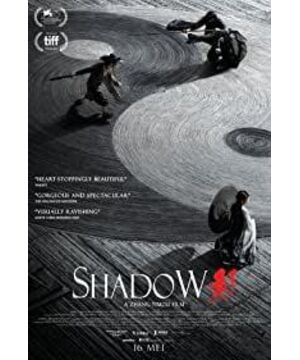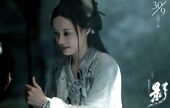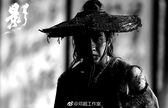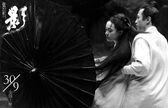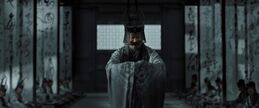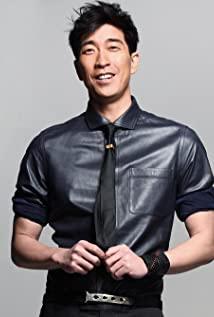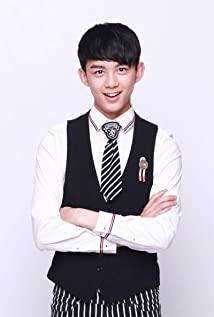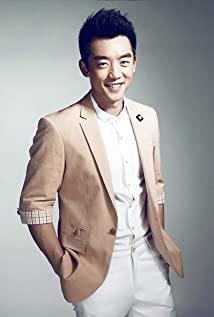I have seen almost all of Zhang Yimou's martial arts films, but what really moved me was the just-released "Shadow". Because it is not just a martial arts film, but a profound reflection on facing human nature, a classic told in a martial arts style.
Compared with Zhang Yimou's other works, "Shadow" is different in at least two points:
First, it breaks free from the shackles of heroic themes, focuses on the individual, and depicts the degeneration of an innocent person's humanity.
Second, there is no perfect personality in the film. Even the innocent and kind-hearted heroine Xiao Ai (played by Sun Li) has become an important part of the conspiracy because of her cowardly and forbearing character.
"Shadow" tells a story: a little man who looks like the Grand Governor Ziyu (Deng Chao) has been secretly imprisoned and intensively trained since he was 8 years old. bait for the revenge plan.
A person, when his memory is deliberately erased, he can't even have a name (the governor calls him Jingzhou, which is the lost land that the governor wants to recover), and he can't control his own destiny, how can he establish the meaning of his life? Woolen cloth? Shadow fell into a deep confusion, which made him an anomaly in the context of national hatred and family hatred.
In order to regain Jingzhou, the Grand Governor failed in the competition with the opponent's defender Yang Cang and was disabled. His perfect image was shattered from then on, and revenge became the only reason for him to live. However, with Peiguo's weakness, how can he support his ideal of happiness and hatred? How can he satisfy his ambitions of military and military affairs? As a result, a long intrigue was launched between the governor and Peiliang, the king of Pei.
In name, Peiliang is the monarch of Pei Kingdom, but he knows that the military power is in the hands of the Grand Governor, and he can't wrestle with the Grand Governor in terms of strength and prestige. Willful and servile to hedge against the Grand Governor's determination to regain lost ground. Pei Wang's performance fooled everyone, but in secret, he also cultivated a group of warriors...
Obviously, this is a tangled situation that is difficult to unravel.
"Shadow" has changed the painting style of Zhang Yimou's films in the past, and instead emphasized the style of ink painting. This may be understood as a metaphor - the world of ink and wash seems simple, black and white are clearly different and cannot be blurred. However, when black and white merged and intertwined with each other, we were surprised that black and white were not as distinct as we thought. Absolute black and absolute white are rare in this world, and more common are boundless, hopeless grays.
People often talk about justice, ideals, loyalty, and tenacity, and they unconsciously yearn for such a world, but has such a world really existed? If there is such a good world, what else can we do, do we still need to exist?
Obviously, "Shadow" signifies that Zhang Yimou is looking at the world from another perspective. In this perspective, there is less romance and yearning, and more criticism and helplessness. To make an inappropriate analogy, it is going from Jin Yong to Fujisawa Zhouping.
Jin Yong's martial arts novel is full of sunshine because it looks at the individual from the perspective of the whole. In the world of Jin Yong, the children of the rivers and lakes, for the sake of justice, do not hesitate to follow up, they never ask: what is justice? What is its significance? Can this justice last forever? Will it betray people...
In Jin Yong's novels, the biggest reason for the action of the characters is the appearance of villains and the emergency of the rivers and lakes. Therefore, "the hero's true character is revealed when the sea is flowing." As for the hero's personal life and emotional journey, it is only a footnote to the tragedy of the times.
Jin Yong's martial arts can move people because it is almost an artistic reproduction of our nation's experience over the past hundred years. In the era of upheaval, disintegration of rituals and broken music, "the great hero serves the country and the people" has comforted too many disappointed souls and given too many people the courage to persevere.
However, Jin Yong's martial arts world is an anomaly after all, and it is too far away from the life of modern people - martial arts do not have to go to work, do not crowd the bus, do not listen to the leaders' reprimands, and do not have to endure the difficulties of Party A. The reality is that the justice of the rivers and lakes that the martial arts people are striving for is actually difficult to realize real welfare.
Looking at martial arts from this perspective, we are bound to find the kindness of Fujisawa Shuhei. Most of the martial arts in his writings are ordinary people, and they all have a miserable life. They draw their knives more because of the compulsion of life than just to stick to their principles. Fujisawa Shuhei sees the world from an individual. And the more you look at it, the more dejected you become at how big the world is—it's big enough to overshadow yourself. So why are we still alive? Where is my life worth?
In fact, Zhang Yimou's martial arts films have always focused on people, but those characters are too idealistic, and they take the initiative to distance themselves from the world. In the era of pan-entertainment, audiences only admit that they are different, but do not admit that they are superior. Spiritual value will put pressure on people, so people are more willing to use ridicule to relieve this pressure.
This is an era that needs more people than heroes, and the charm of "Shadow" is precisely that its protagonist is an innocent confused person who is deprived of himself and forced to join the cruel power game, but unexpectedly Become a profiteer, so he began to indulge in this game.
From Jin Yong to Fujisawa Shuhei, from heroism to borderline personality, "Shadow" obviously captures the confusion in the hearts of modern people. After all, too many people are living like shadows. Even if they can have their own names, they have no deeper meaning. Has been transformed into a symbol.
Memories of the self are so similar that they become so boring that it is difficult to add anything other than kindergarten, elementary, middle school, and college. As a modern person, very few people can name their great-grandfather. The so-called I have become a rootless thing and can only be traced back to three generations at most. Our interest in origin and memory has been quietly deprived.
The more you live, the more like someone else's stand-in, and the more you live, the more you are subsumed by other people's goals. However, although the elegiac of generosity is magnificent, as a small person, besides sacrifice, what other ways are there to participate? Or, this is the general anxiety of modern people: we have all entered the world without knowing exactly how it works, let alone who is in charge of it.
In "Shadow", the basic elements of Zhang Yimou's martial arts films are still there, such as lyrical close-ups and slow motions, rich atmosphere rendering, ingenious martial arts equipment, and slightly exaggerated plot reversals, but its characters are more grounded Qi - At the end of the film, Shadow escapes the death trap, and facing the stunned ministers, he finally has his own demeanor, however, this demeanor is so similar to the former Grand Governor. The instant change of Shadow's facial expression, in contrast to the expression of Tian Zhan, a henchman of the Great Governor, can be called a classic.
Obviously, this is a meaningful hint left by Zhang Yimou: the cruelty is only temporarily over, the tragedy will continue, and no one can escape the dark fate.
View more about Shadow reviews


